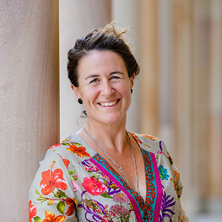
Increased awareness of climate change and sustainability has been noted in our community post COVID-19, according to researchers from The University of Queensland.
Dedicated to understanding corporate social responsibility and sustainability communication, Senior Lecturer in UQ’s School of Communication and Arts Dr Franzisca Weder has turned her focus to the ways COVID-19 has impacted sustainability practices since the pandemic hit.
After exploring post-COVID-sustainability visions with Dr Jennifer Yarnold from the Centre for Policy Futures, Dr Weder now studies sustainable (consumption) practices before, during and after the pandemic with colleagues from the UQ/Aurecon partnership.
“I have always been interested in the gap between the narrative of sustainability that is communicated by corporates, political institutions or organisations and sustainability as a moral compass used to valuate individual practices,” Dr Weder said.
“At the same time, I strongly believe that sustainability is the guiding principle of the new millennium and will help society face global challenges like a warming climate and a worldwide pandemic,” she said.
Dr Weder focuses her research on different forms of engagement in environmental issues – individual, community and organisational engagement.
“I’m passionate about applying innovative forms of narrative inquiries to identify sustainability related social representations, practices and engagement.”
Dr Weder said communication is fundamental for sustainable development – not only in the sense of knowledge and information transfer or of creating awareness by placing sustainability and its related issues on both the public and political agenda, but also to initiate a social change process towards a sustainable society and lifestyle.
“Communication links individuals to cultural patterns, rituals and societal discourses, which offer frameworks to investigate collective as well as individual meaning-making,” she said.
When it comes to teaching, Dr Weder has an innovative style – mixing critical research and a conversational approach.
“I like to stimulate out-of-the-box thinking and want my students to realise that everyone can be an agent of change,” she said.
Dr Weder and some of her students started a Facebook group iSustain, whose members share a commitment to sustainability by engaging in practices like eating less meat, using less plastic and reducing waste by reusing items.
“The students also aim to build awareness via the sustainability section on Jacdigital, where they will create a larger storytelling platform to spark further conversations on sustainability – and disrupt existing habits and common sense,” Dr Weder said.
Dr Weder is part of an ongoing research collaboration on sustainability with colleagues across The University of Waikato (New Zealand), University of Klagenfurt (Austria), Academy of Sciences Vienna (Austria), Technical University of Ilmenau (Germany), University of Applied Sciences in Vienna and Carinthia (Austria).
As Chair of the Austrian Association of Communication Studies and Vice-Chair of the International Environmental Communication Association (IECA), Dr Weder perceives herself as change agent, fighting for environmental and social transformation.



